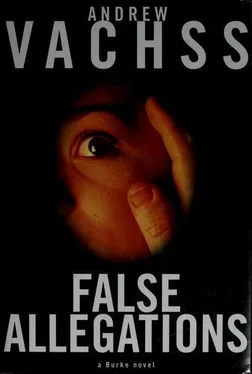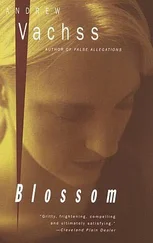I ate a little bit of the blah food they served, watching the letters Brother Jacob had written to Jennifer Dalton come up on the screen in my head. They were all fun–house mirrors, tricky reflections, bending your vision. The handwriting was strong, with a confident right–hand slant. On heavy, cream–colored, watermarked paper, each letter only one sheet, one side. No return address, no monogram. Expensively anonymous.
Dear One,
I know it's hard for you, Jennifer. It's hard for me as well. But there is a right way to do everything, even the most difficult tasks. Patience doesn't come easily to someone your age, but the greatest joys in life are always worth the investment.
And another…
Most things in life are all a matter of perspective. How you look at something is more important than what you're looking at. You've seen this for yourself, haven't you, dear?
All the same…
Remember, Jennifer, your feelings are your own. They are private, special things, unique to you and you alone. And you are always entitled to them. They are always yours. The best things in life are always investments . You have to wait for them to pay off. And this takes patience. I know things are hard for you now, but they'll get better, I promise.
I thought about promises. In the hands of an expert, they're like razor cuts—so sharp the target never feels them until he sees the blood.
And when the target trusts you enough, sometimes he doesn't even see the blood. Until it's almost all gone.
Irented a bronze Taurus sedan at the airport and used the City Planning Commission maps to find him. It wasn't hard—the house was in Brother Jacob's name, and I had a pretty good photo that came with the file Kite had given me.
A pearlescent orange Jeep chugged up next to me at a light. The sun blazed on the Jeep's wheels—masterpieces of sculpture with hand–set centerpieces, gold–plated. A set like that can set you back a few thousand dollars. Useless—you're paying for the flash. Like two–hundred–dollar sneakers. And like the ultra–sneakers, there were more people stealing them than working for them. And not even real stealing—the robot mutant psychopaths don't have the brains to boost a car or shoplift some shoes, so they rough it off face–to–face. Your stuff or your life—either one gratifies the urban punk killing machines.
It was late afternoon by the time I found the place. A freestanding house of weathered white wood on a short block in what looked like a middle–class neighborhood with aspirations. A matching one–car garage stood at the end of a driveway, no fence around the small front yard. The house looked well tended, but whoever owned it wasn't obsessive about it—the lawn could have used a trim and one of the trees had branches that wouldn't last through the fast–coming winter.
I parked across the street and settled in to watch. A trio of kids flew past on fat–tired trail bikes, shouting each other's names. A woman walked by with a chocolate lab on leash. It was an active block, probably had its share of housebound watchers too. But I wasn't worried about it—if I got out of there without being arrested, the license plate would dead–end with the Stanley Weber ID.
I pulled around the corner and waited. It stayed quiet until evening dropped black–edged gray over the block. Lights snapped on in houses as kids went back inside. Suppertime. I dialed the number I had for Brother Jacob on the cellular phone I'd brought with me. If a housekeeper answered, I'd have to think of another way.
"Hello?" A man's voice. Middle–aged but vigorous without being aggressive.
"Could I speak to Brother Jacob, please?"
"Speaking."
"My name is Weber, sir. Stanley Weber. I wonder if I could have a few minutes of your time. I—"
"I don't ever respond to telephone solicitations," he said. "If you'd like, you can mail—"
"This isn't a solicitation, sir. I'd like to talk to you about a matter of mutual interest. In a way, I guess you're right: I am a salesman. But what I have to sell isn't to the general public—you're the only one who would be interested, I think."
"I don't understand."
"I could explain better in person, sir. I have some documents you might be interested in purchasing."
"Documents?"
"Yes. I'd rather not go into it on the phone, if you don't mind. I believe it's in your interest that we speak. Privately."
"Look, I don't know who you—"
"It concerns a former…student of yours, Brother Jacob. A young lady. Miss Jennifer Dalton."
The phone went silent, but he hadn't hung up. I listened to him breathing—I couldn't tell if the hook was set. Finally he said, "I'm not sure what you're talking about, actually. But if you would like to—"
"Just a few minutes of your time, sir. At your convenience."
"Yes. Very well. Do you know where I—?"
"I can be at your house in, say, fifteen minutes. Would that be convenient?"
He went back to breathing again. Then: "All right. But I don't have a lot of time. I'm expecting—"
"I'll be right over," I said, cutting the connection.
Igave it ten minutes. Then I locked up the car and walked around the corner to the white house. The door was painted a dull red, with a switch for the bell set into its center. I turned the switch to the right and heard the ding–dong sound inside.
A medium–height white man opened the door. He had thick dark hair set unnaturally low on his forehead. A toupee, and an expensive one. He was about my height, with a soft round jowly face, and he wore a red flannel shirt over a pair of old putty–colored corduroy pants, brown blunt–toed brogans on his feet. His eyes were pale blue, set deep into their sockets.
"Mr.…" he said.
"Weber," I finished for him. "May I come in?"
My midnight–blue suit and white silk shirt reassured him slightly, but he still looked spooked. Maybe because I wasn't wearing a tie.
"Uh…certainly," he said, stepping aside.
The living room was just past the foyer, furnished in what I guessed were antiques: heavy, solid dark wood, light chintz upholstery. I took the couch. He thought about sitting next to me, then passed in favor of a straight chair with padded arms.
"You said…"
"Jennifer Dalton," I told him again, looking at his mouth, avoiding his eyes. I was there as a salesman, not an interrogator. "I have some…documents which I thought might be of interest to you."
"Documents?"
"Letters," I said gently. "Your letters, I think."
"Why would you…?"
"Miss Dalton has been seeing someone. A therapist. In the course of their…work together, she brought the letters in."
"I don't understand," he said, his voice fibrous with tension.
"It's quite a common thing," I said smoothly. "When a patient is trying to…recapture their past, a therapist often asks for…keepsakes. To reconstruct events."
"But I don't—"
"I understand," I told him. "Maybe this was a bad idea. If I wasted your time, I apologize."
"Well," he said, clearing his throat, "I don't know. I mean…I can't say."
"You tell me," I said, opening the black aluminum attaché case and taking out one of the letters. I handed it over to him, then busied myself looking through some other papers, keeping my eyes down.
He took the letter. I could hear him turning the single page over in his hand. "This is…this appears to be, something I…might have written a long time ago."
"Yes."
"A letter of encouragement. To a young woman with many personal problems."
"Yes."
"Why would you have this?" he asked, breathing through his mouth.
"I'm a businessman," I said. "I have my finger in a number of pies, so to speak. Therapists aren't very well paid. And this particular therapist happens to owe some money. Not to American Express…to some people who are very impatient."
Читать дальше











